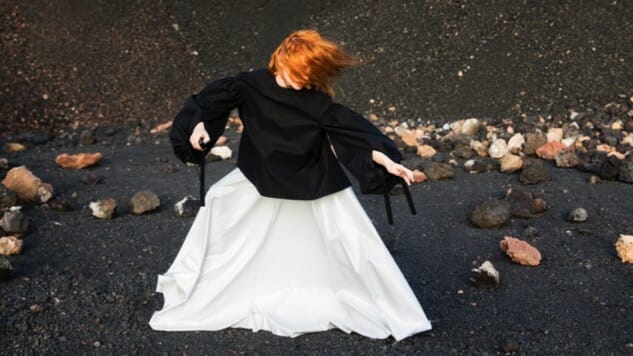Goldfrapp: The Artists Are Present

Alison Goldfrapp often punctuates her sentences with “I don’t know.” It’s more than a nervous verbal tic or an attempt to dodge questions in the middle of an arduous day of press. After all, she and Goldfrapp bandmate Will Gregory have had a partnership that has lasted longer than many marriages and spanned multiple styles across seven albums. (A feat they credit to their very English habit of keeping work and personal relationships separate.) Her resume as an artist speaks for itself. To date she’s shaped her delicate soprano into the role of dancefloor queen (Supernature), ambient ghost (Felt Mountain) and haunted storyteller (2013’s Tales of Us). But talking about the machinery that puts it all into place—that’s tricky. Making music is easier…at least most of the time.
“You can spend days thinking ‘Fuck! Nothing is happening!’” she says, laughing. “You feel like you’re hitting your head against a brick wall. Then you’ll have a flurry of stuff happening and ideas popping out. It suddenly comes together. That’s really exciting. I think that’s why it’s so important to do stuff. Not just sit around for inspiration. Only in that process of doing do you make things happen. That’s the exciting bit, I think.”
“It doesn’t get easier,” Gregory adds. “If someone knows, send them here quick! Get them to tell us because we’d like to know.”
After a year and a half of tour and a slight detour into theater, writing a score for a Greek tragedy playing at the National Theater of London, Goldfrapp and Gregory began work on what would become Silver Eye. They knew after the largely acoustic Tales of Us they wanted to dip back into the electronic world. And both of them knew they wanted to experiment with darker tones. Rather than go it alone (“Sometimes we just sit across the room from each other and just say ‘help!’” Gregory jokes.), they brought an additional musician, Bobby Krlic—better known as witch house producer The Haxan Cloak. While they’ve always had additional musicians on their recordings, and both Goldfrapp and Gregory say they’ve wanted the process to be more collaborator-friendly. This is the first time they’ve successfully added to their braintrust during the initial writing process.
“It’s hard to find people that you click with musically,” Goldfrapp confesses. “I think it’s quite a special magical thing that happens. Just because you really like what someone does musically doesn’t mean to say that it’s going to click with you when you’re working. It’s not necessarily logical how these things work. Personality, schedule. Does it complement what you’re trying to do? There was definitely a couple of people we got in thinking it was going to connect and it didn’t. You can’t predict how these things work.”
-

-

-

-

-

-

-

-

-

-

-

-

-

-

-

-

-

-

-

-

-

-

-

-

-

-

-

-

-

-

-

-

-

-

-

-

-

-

-

-








































